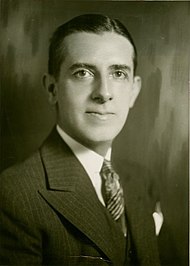Prentice Cooper
| Prentice Cooper | |
|---|---|
 |
|
| 39th Governor of Tennessee | |
|
In office January 16, 1939 – January 16, 1945 |
|
| Preceded by | Gordon Browning |
| Succeeded by | Jim Nance McCord |
| United States Ambassador to Peru | |
|
In office July 1, 1946 – June 29, 1948 |
|
| President | Harry S. Truman |
| Preceded by | William D. Pawley |
| Succeeded by | Harold H. Tittman, Jr. |
| Member of the Tennessee Senate | |
|
In office 1936-1939 |
|
| Personal details | |
| Born |
September 28, 1895 Bedford County, Tennessee |
| Died | May 18, 1969 (aged 73) Rochester, Minnesota |
| Resting place | Jenkins Chapel Cemetery Shelbyville, Tennessee |
| Political party | Democratic |
| Spouse(s) | Hortense Powell (m. 1950) |
| Alma mater |
Princeton University (B.A.) Harvard Law School (LL.B) |
| Profession | Attorney |
| Religion | Lutheran |
| Military service | |
| Allegiance |
|
| Service/branch |
|
| Years of service | 1917-1919 |
| Rank | Second Lieutenant |
| Unit | 307th Field Artillery |
| Battles/wars | World War I |
William Prentice Cooper, Jr. (September 28, 1895 – May 18, 1969) was an American politician who served as Governor of Tennessee from 1939 to 1945. He led the state's mobilization efforts for World War II, when over 300,000 Tennesseans joined the armed forces, and numerous defense-related facilities were established across the state. He later served as U.S. Ambassador to Peru (1946–1948), and chaired Tennessee's 1953 constitutional convention.
Cooper was born at the home of his maternal grandparents along the Duck River in Bedford County, Tennessee. He was the son of William Prentice Cooper, an attorney and businessman, and Argentine (Shofner) Cooper. He attended private schools in nearby Shelbyville, and graduated in 1913 from the Webb School in Bell Buckle, where he was president of the debate team.
In 1914, Cooper enrolled in Vanderbilt University, where he was a member of Phi Delta Theta and vice president of the freshman class. After two years, he transferred to Princeton University, from which he graduated in 1917 with a Bachelor of Arts. Following the U.S. entry into World War I, he enlisted in the Army, initially serving with the 307th Field Artillery before being transferred to Fort Monroe in Virginia. He was discharged in January 1919 with the rank of second lieutenant.
Cooper enrolled in Harvard Law School in February 1919, and graduated with an LL.B in 1921. He was admitted to the bar in 1922, and began practice in Shelbyville. That same year, he was elected to the Tennessee House of Representatives, where he secured passage of the state's Uniform Declaratory Judgments Act.
...
Wikipedia
